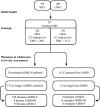ADGRL3 (LPHN3) variants are associated with a refined phenotype of ADHD in the MTA study
- PMID: 27652281
- PMCID: PMC5023939
- DOI: 10.1002/mgg3.230
ADGRL3 (LPHN3) variants are associated with a refined phenotype of ADHD in the MTA study
Abstract
Background: ADHD is the most common neuropsychiatric condition affecting individuals of all ages. Long-term outcomes of affected individuals and association with severe comorbidities as SUD or conduct disorders are the main concern. Genetic associations have been extensively described. Multiple studies show that intronic variants harbored in the ADGRL3 (LPHN3) gene are associated with ADHD, especially associated with poor outcomes.
Methods: In this study, we evaluated this association in the Multimodal Treatment Study of children with ADHD (MTA), initiated as a 14-month randomized clinical trial of 579 children diagnosed with DSM-IV ADHD-Combined Type (ADHD-C), that transitioned to a 16-year prospective observational follow-up, and 289 classmates added at the 2-year assessment to serve as a local normative comparison group (LNCG). Diagnostic evaluations at entry were based on the Diagnostic Interview Schedule for Children-Parent (DISC-P), which was repeated at several points over the years. For an add-on genetic study, blood samples were collected from 232 in the MTA group and 139 in the LNCG.
Results: For the 205 MTA participants, 14.6% retained the DISC-P diagnosis of ADHD-C in adolescence. For 127 LNCG participants, 88.2% remained undiagnosed by the DISC-P. We genotyped 15 polymorphic SNP markers harbored in the ADGRL3 gene, and compared allele frequencies for the 30 cases with continued diagnosis of ADHD-C in adolescence to the other participants. Replication of the association of rs2345039 ADGRL3 variant was observed (P value = 0.004, FDR corrected = 0.03; Odds ratio = 2.25, upper CI 1.28-3.97).
Conclusion: The detection of susceptibility conferred by ADGRL3 variants in the extreme phenotype of continued diagnosis of ADHD-C from childhood to adolescence provides additional support that the association of ADGRL3 and ADHD is not spurious. Exploring genetic effects in longitudinal cohorts, in which refined, age-dependent phenotypes are documented, is crucial to understand the natural history of ADHD.
Keywords: ADGRL3; ADHD; LPHN3; MTA; genetics.
Figures
References
-
- Arcos‐Burgos, M. , Jain M., Acosta M. T., Shively S., Stanescu H., Wallis D., et al. 2010. A common variant of the latrophilin 3 gene, LPHN3, confers susceptibility to ADHD and predicts effectiveness of stimulant medication. Mol. Psychiatry 15:1053–1066. - PubMed
Grants and funding
LinkOut - more resources
Full Text Sources
Other Literature Sources


